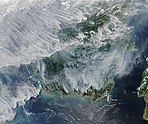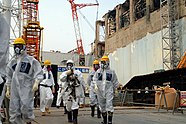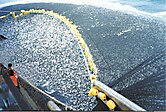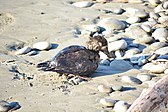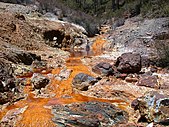環境問題
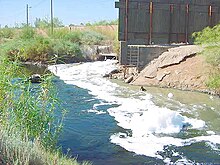
環境問題(英語:Environmental issues)指的是對生態系統功能所造成的破壞。[1]此外,這些問題或由人類所造成(參見人類對環境的影響),[2]也可能是自然界本身所產生。當受損的生態系統無法恢復時,會被認為是嚴重問題,如果預測註定要崩潰,則被認為是屬於災難性的。
環境保護是為環境和人類的利益而在個人、組織或政府層面上進行保護自然環境的措施。環境保護主義是一種社會運動,也是種環境運動,透過倡導、立法、教育和行動主義的手段來解決這類問題。[3]
人類造成環境破壞是個全球性、持續存在的問題。[4]水污染會為海洋生物帶來問題。[5]大多數學者認為根據地球限度理論,人類依據永續性的方式生活,地球生態系統可容納的人口高峰將落在90-100億之間。[6][7][8]大部分的環境問題是由世界上最富有的人群因過度消費所造成。[9][10][11]聯合國環境署在2021年發佈名為《與自然和平共處(Making Peace With Nature)》報告中提出,如果各方努力實現永續發展目標,如污染、氣候變化和生物多樣性喪失等主要危機將可解決。[12]
類型
[編輯]目前的主要環境問題包括有氣候變化、污染、環境退化和資源枯竭。保育運動人士發起遊說以保護瀕危物種和任何具有生態價值的自然區域。聯合國把國際環境問題歸納有三個具有關鍵性,稱為地球三重危機:氣候變化、污染和生物多樣性喪失。[13]
人類影響
[編輯]| 系列條目 |
| 社會學 |
|---|
 |
| 主要的社會學理論 |
| 研究方法 |
| 主要分支學科 |
| 其他相關信息 |
人類對環境的影響(英語:Human impact on the environment,或稱為人為影響(英語:anthropogenic impact))指的是人類直接或間接對生態環境、[14]生態系統、生物多樣性和自然資源[15][16]所造成的改變。人類改變環境以適應自身建成環境的需求已產生嚴重的影響,[17][18]包括有氣候變化、[14][19]環境退化[14](如海洋酸化[14][20])、大規模物種滅絕和生物多樣性喪失、[21][22][23][24]生態危機以及生態崩潰。造成這類規模擴及全球的環境損害(直接或間接所產生)的人類活動包括有人口增長、[25][26]過度消費、過度開發、污染和森林砍伐。其中有些問題,包括有氣候變化和生物多樣性喪失,已被認為是危及人類生存的全球災難危機。[27][28]
環境退化
[編輯]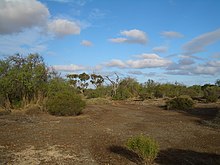
本節摘自環境退化。
環境退化是指因空氣、水和土壤等的品質惡化,造成資源枯竭而發生環境惡化、生態系統遭破壞、棲息地破壞、野生動物滅絕,以及環境污染。任何被認為對環境有害,或是不良的變化或干擾均可定義為環境退化。[29]
環境問題可定義為任何人類活動對環境(包括其生物和物理特徵)造成的負面影響。一些導致人們擔憂的主要環境挑戰包括空氣污染、水污染、自然環境污染、垃圾污染等。[30]
環境退化是聯合國處理威脅、挑戰和變化高級別小組針對全球面臨的十大威脅正式提出警告的其中之一。聯合國降低災難風險辦公室將環境退化定義為"環境滿足社會和生態目標及需求的能力降低"。[31]環境退化有多種類型,當發生棲息地破壞或自然資源耗盡時,環境就會退化。解決此一問題的方式包括環境保護和環境資源管理。由於管理不善而發生的環境退化也會導致環境衝突(社區組織起而對抗造成環境管理不善的機構)。
環境衝突
[編輯]
本節摘自環境衝突。
環境衝突或生態分配衝突(ecological distribution conflict,EDC)是由於環境退化或環境資源分配不均而引發的社會衝突。[32][33][34]截至2020年4月,專門登載全球環境衝突事件的網站《環境正義地圖集》就記錄有3,100起事件,並強調另有更多衝突並未列入其中。[32]參與這類衝突的各方包括當地受到影響的社區、州、公司和投資者,以及社會或環境運動團體,[35][36]典型的事件是環境捍衛者在保護他們的家園免受資源剝奪或危險廢棄物棄置的影響。[32]資源開採和危險廢物棄置活動常造成資源稀缺(例如過度捕撈或森林砍伐)、污染環境,並導致人類和自然的生存空間退化,最終導致衝突。[37]環境衝突的一個特例是林業衝突(或稱森林衝突),此種衝突"被廣泛視為不同利益團體之間,針對與森林政策和森林資源利用有關的價值觀和問題,所發生不同強度的鬥爭"。[38]全球在過去幾十年裏有越來越多的此類事件發生。[39]
環境衝突常集中在環境正義議題、原住民權利、農民權利或對依賴海洋為生社區的威脅。[32]地方衝突越來越受環境正義運動跨國網絡的影響。[32][40]
環境衝突可能會讓應對自然災害變得複雜或加劇現有衝突 - 特別是在地緣政治爭端或社區人民被迫流離失所,變成環境難民的情況下。[41][34][42]
社會環境衝突、環境衝突或生態分配衝突(EDC)等名詞有時可互換使用。對這些衝突的研究涉及生態經濟學、政治生態學和環境正義等領域。
成本
[編輯]氣候變化經濟分析(英語:Economic analysis of climate change)敘述如何應用經濟思維、工具和技術來估算氣候變化造成損害的程度和分佈,還為大至涵蓋全球,小至只包括家庭於緩解和調適的政策和方法提供資訊。這個主題還包括替代經濟方法,例如生態經濟學和去增長。在氣候變化影響、調適和緩解之間的權衡取捨,透過成本效益分析予以分辨。針對氣候變化進行成本效益分析,使用的是綜合評估模型(integrated assessment models,IAM),這類模型將自然科學、社會科學和經濟學的各個方面予以結合運用。氣候變化對經濟的整體影響不易估計,但確會隨着氣溫升高後而增加。[43]
氣候變化影響可作為一種經濟成本來衡量。[44]:936-941這對市場影響而言特別適合,因其牽涉到市場活動,會直接影響到國內生產毛額(GDP) 。然而所產生的非市場影響(例如對人類健康和生態系統的影響)則難以貨幣形式表達(貨幣化)。因此對氣候變化作經濟分析具有挑戰性,主要這是種長期問題,且在國家內部和國家之間存在重大的分配問題。此外,它還涉及氣候變化造成的物理損害、人類應對和未來社會經濟發展方面均有不確定性。行動
[編輯]環境正義
[編輯]本節摘自環境正義。
環境正義(或稱生態正義(eco-justice))是一種針對環境不公的社會運動,當貧窮或邊緣化社區受到危險廢棄物、資源開採和他們無法從中受益的土地利用的傷害時,就會引發這種運動。[45]目前已有數百項針對此種運動的研究,報告中顯示全球環境危害並非以均勻方式分佈。[46]
環境運動於1980年代從美國開始。這種運動深受美國民權運動的影響,議題聚焦於富裕國家內部的環境種族主義。該運動後來擴大到把性別、國際環境不公以及發生於邊緣群體的不平等現象都包括在內。當此類運動在富裕國家取得某種程度的成功,對於環境問題的注意力又轉移到全球南方(Global South,參見南北分歧)如資源剝奪主義或全球廢棄物交易)的議題,導致環境正義運動變得更為全球化,其中有些已由聯合國予以闡明。此運動與原住民土地權和健康環境權運動發生重疊。[34]
環境正義運動的目標是幫助邊緣社區能自主做出影響其生活環境的決策。全球環境正義運動源自地方環境衝突,其中環境捍衛者經常就此與資源開採或其他產業的跨國公司發生對抗行動。而地方性的衝突越來越受到跨國環境正義網絡的影響。[32][47]
研究環境正義學者創作大量跨學科社會科學文獻,其中有些可增進政治生態學、環境法學以及正義和永續性的內涵。[45][48]
環境法
[編輯]本節摘自環境法。
環境法是用於保護環境的法律,[49]是規範人類如何與環境互動的法律、法規、協議和普通法的總和,[50]其中包括環境法規、有關森林、礦物或漁業等自然資源管理的法律,以及環境影響評估等相關主題。環境法被視為一種法律體系,涉及保護生物(包括人類)免受人類活動立即或最終對其或其物種造成直接或間接,或是對其依賴的媒介及棲息地的傷害。[51]
環境影響評估
[編輯]本節摘自環境影響評估。
環境影響評估(Environmental Impact assessment,EIA)是在決定推動擬議行動之前對計劃、政策、計劃或實際項目的環境後果所進行的評估。在這種情況下,所謂"環境影響評估"一詞通常用於個人或公司要執行的項目,而"策略性環境評估(strategic environmental assessment,SEA)"一詞則適用於國家機關經常提出的政策、計劃和方案。[52][53]EIA是管理環境的工具,是項目審批和決策中包含的元素。[54]環境影響評估可能會受到有關公眾參與和決策行政程序的管轄,也可能受到司法的審查。
評估的目的是確保決策者在決定是否進行項目時將環境影響列入考慮。國際環境影響評估協會(IAIA)將環境影響評估定義為"在做出重大決定和承諾之前,先識別、預測、評估和減輕開發提案所具有生物物理、社會和其他相關影響的程序"。[55]評估的獨特之處在於其並未要求項目達到預定的環境結果,而是要求決策者在過程中考慮環境價值,並根據詳細的環境研究和公眾對潛在環境影響的評論來證明這些決策的合理性。[56]
環保運動
[編輯]
本節摘自環保運動。
環保運動(有時稱為生態運動)是一項社會運動,目的在保護自然界免受有害環境行為的影響,以創造綠色生活。[57]環保人士主張透過改變公共政策和個人行為改變來公正和永續地管理資源和環境。[58]此運動認為人類是生態系統的參與者(而非敵人),其重點是生態、健康和人權。
環保運動是一種國際運動,以一系列環保組織(包含企業與草根組織)為代表,各國的情況各不相同。由於參與者眾多、信仰各異,且因強烈,以及偶爾的投機性質,運動中倡導的目標並非完全一致。從最廣泛的意義上講,此運動包括普通公民、專業人士、擁抱環保主義的宗教信仰者、政治家、科學家、非營利組織以及某些個人倡導者。
環境組織
[編輯]環境問題由政府組織在區域、國家或國際上的不同的層面予以處理。
最大的國際機構是聯合國環境署(成立於1972年)。國際自然保護聯盟匯集有83個國家、108個政府機構、766個非政府組織、81個國際組織,以及來自世界各國約1萬名專家、科學家。[59]國際性非政府組織則例如有綠色和平組織、地球之友和世界自然基金會。各國政府制定環境政策並執行環境法,但其中的執行力度各不相同。
影片與其他流行文化
[編輯]有越來越多涉及環境問題的影片被製作,特別是針對氣候變化與衍生的全球變暖及其他問題。
電影《不願面對的真相》(美國前副總統艾爾·高爾於2006年推出的電影)提起大西洋經向翻轉環流(AMOC)可能會停止,以及當北極冰蓋融化而導致進入北大西洋的淡水流量增加,對歐洲氣溫的影響。
電影《明天過後》和名為《冰(Ice)》的英國電視劇集都以誇張的場景來探討與AMOC停止的相關後果。
美國科幻小說作者金·史丹利·羅賓遜的作品《降溫五十度》是他的《首都科學》系列中的第二部作品,描述溫鹽環流停止,以及人類通過向海洋中添加大量鹽來盡力恢復此環流的故事。
在軍事科幻小說家伊恩道格拉斯的《星際醫護兵(Star Corpsman)》 系列小說中,AMOC的停止引發早期盛冰期,到22世紀中葉,加拿大大部分地區和北歐均因此遭到冰雪覆蓋。
參見
[編輯]問題
- 環境問題列表 (包括緩解與保育行動)
特定問題
參考文獻
[編輯]- ^ Jhariya et al. 2022. ([//web.archive.org/web/20230217143622/https://www.sciencedirect.com/book/9780128229767/natural-resources-conservation-and-advances-for-sustainability 頁面存檔備份,存於互聯網檔案館) "Natural Resources Conservation and Advances for Sustainability" Chapter 7.5 ISBN 978-0-12-822976-7
- ^ Human Impacts on the Environment. education.nationalgeographic.org. [2023-05-06]. (原始內容存檔於2023-09-30) (英語).
- ^ Eccleston, Charles H. (2010). Global Environmental Policy: Concepts, Principles, and Practice (頁面存檔備份,存於互聯網檔案館). Chapter 7. ISBN 978-1439847664.
- ^ McNeill, Z. Zane. Humans Destroying Ecosystems: How to Measure Our Impact on the Environment. 2022-09-07 [2023-05-06]. (原始內容存檔於2023-12-09) (美國英語).
- ^ Marine Pollution. education.nationalgeographic.org. [2023-05-06]. (原始內容存檔於2024-01-08) (英語).
- ^ Alberro, Heather. Why we should be wary of blaming 'overpopulation' for the climate crisis. The Conversation. [2020-12-31]. (原始內容存檔於2024-02-20) (英語).
- ^ David Attenborough's claim that humans have overrun the planet is his most popular comment. www.newstatesman.com. 2020-11-04 [2021-08-03]. (原始內容存檔於2021-08-03) (英語).
- ^ Dominic Lawson: The population timebomb is a myth The doom-sayers are becoming more fashionable just as experts are coming to the view it has all been one giant false alarm. The Independent (UK). 2011-01-18 [2011-11-30]. (原始內容存檔於2011-10-13).
- ^ Nässén, Jonas; Andersson, David; Larsson, Jörgen; Holmberg, John. Explaining the Variation in Greenhouse Gas Emissions Between Households: Socioeconomic, Motivational, and Physical Factors. Journal of Industrial Ecology. 2015, 19 (3): 480–489 [2023-10-10]. ISSN 1530-9290. S2CID 154132383. doi:10.1111/jiec.12168. (原始內容存檔於2024-02-18) (英語).
- ^ Moser, Stephanie; Kleinhückelkotten, Silke. Good Intents, but Low Impacts: Diverging Importance of Motivational and Socioeconomic Determinants Explaining Pro-Environmental Behavior, Energy Use, and Carbon Footprint. Environment and Behavior. 2017-06-09, 50 (6): 626–656 [2023-10-10]. ISSN 0013-9165. S2CID 149413363. doi:10.1177/0013916517710685. (原始內容存檔於2022-11-03).
- ^ Lynch, Michael J.; Long, Michael A.; Stretesky, Paul B.; Barrett, Kimberly L. Measuring the Ecological Impact of the Wealthy: Excessive Consumption, Ecological Disorganization, Green Crime, and Justice. Social Currents. 2019-05-15, 6 (4): 377–395 [2023-10-10]. ISSN 2329-4965. S2CID 181366798. doi:10.1177/2329496519847491. (原始內容存檔於2022-11-03).
- ^ Environment, U. N. Making Peace With Nature. UNEP - UN Environment Programme. 2021-02-11 [2022-02-18]. (原始內容存檔於2024-02-19) (英語).
- ^ SDGs will address 'three planetary crises' harming life on Earth. UN News. 2021-04-27 [2022-02-18]. (原始內容存檔於2023-09-26) (英語).
- ^ 14.0 14.1 14.2 14.3 Climate Science Special Report – Fourth National Climate Assessment (NCA4), Volume I, Executive Summary. U.S. Global Change Research Program: 1–470. [2017-12-02]. (原始內容存檔於2019-06-14).
This assessment concludes, based on extensive evidence, that it is extremely likely that human activities, especially emissions of greenhouse gases, are the dominant cause of the observed warming since the mid-20th century. For the warming over the last century, there is no convincing alternative explanation supported by the extent of the observational evidence. In addition to warming, many other aspects of global climate are changing, primarily in response to human activities. Thousands of studies conducted by researchers around the world have documented changes in surface, atmospheric, and oceanic temperatures; melting glaciers; diminishing snow cover; shrinking sea ice; rising sea levels; ocean acidification; and increasing atmospheric water vapor.
- ^ Sahney, S., Benton, M.J. and Ferry, P.A. Links between global taxonomic diversity, ecological diversity and the expansion of vertebrates on land. Biology Letters. 2010, 6 (4): 544–547. PMC 2936204
 . PMID 20106856. doi:10.1098/rsbl.2009.1024.
. PMID 20106856. doi:10.1098/rsbl.2009.1024.
- ^ Hawksworth, David L.; Bull, Alan T. Biodiversity and Conservation in Europe. Springer. 2008: 3390. ISBN 978-1402068645.
- ^ Stockton, Nick. The Biggest Threat to the Earth? We Have Too Many Kids. Wired.com. 2015-04-22 [2017-11-24]. (原始內容存檔於2019-12-18).
- ^ Ripple, William J.; Wolf, Christopher; Newsome, Thomas M; Barnard, Phoebe; Moomaw, William R. World Scientists' Warning of a Climate Emergency. BioScience. 2019-11-05 [2019-11-08]. doi:10.1093/biosci/biz088. hdl:1808/30278
 . (原始內容存檔於2020-01-03).
. (原始內容存檔於2020-01-03). Still increasing by roughly 80 million people per year, or more than 200,000 per day (figure 1a–b), the world population must be stabilized—and, ideally, gradually reduced—within a framework that ensures social integrity. There are proven and effective policies that strengthen human rights while lowering fertility rates and lessening the impacts of population growth on GHG emissions and biodiversity loss. These policies make family-planning services available to all people, remove barriers to their access and achieve full gender equity, including primary and secondary education as a global norm for all, especially girls and young women (Bongaarts and O』Neill 2018).
- ^ Cook, John. Consensus on consensus: a synthesis of consensus estimates on human-caused global warming. Environmental Research Letters. 2016-04-13, 11 (4): 048002. Bibcode:2016ERL....11d8002C. doi:10.1088/1748-9326/11/4/048002
 .
. The consensus that humans are causing recent global warming is shared by 90%–100% of publishing climate scientists according to six independent studies
- ^ Increased Ocean Acidity. Epa.gov. United States Environmental Protection Agency. 30 August 2016 [2017-11-23]. (原始內容存檔於2011-06-23).
Carbon dioxide is added to the atmosphere whenever people burn fossil fuels. Oceans play an important role in keeping the Earth's carbon cycle in balance. As the amount of carbon dioxide in the atmosphere rises, the oceans absorb a lot of it. In the ocean, carbon dioxide reacts with seawater to form carbonic acid. This causes the acidity of seawater to increase.
- ^ Leakey, Richard and Roger Lewin, 1996, The Sixth Extinction : Patterns of Life and the Future of Humankind, Anchor, ISBN 0-385-46809-1
- ^ Ceballos, Gerardo; Ehrlich, Paul R.; Barnosky, Anthony D.; Garcia, Andrés; Pringle, Robert M.; Palmer, Todd M. Accelerated modern human–induced species losses: Entering the sixth mass extinction. Science Advances. 2015, 1 (5): e1400253. Bibcode:2015SciA....1E0253C. PMC 4640606
 . PMID 26601195. doi:10.1126/sciadv.1400253.
. PMID 26601195. doi:10.1126/sciadv.1400253.
- ^ Pimm, S. L.; Jenkins, C. N.; Abell, R.; Brooks, T. M.; Gittleman, J. L.; Joppa, L. N.; Raven, P. H.; Roberts, C. M.; Sexton, J. O. The biodiversity of species and their rates of extinction, distribution, and protection (PDF). Science. 2014-05-30, 344 (6187): 1246752 [2016-12-15]. PMID 24876501. S2CID 206552746. doi:10.1126/science.1246752. (原始內容存檔 (PDF)於2020-01-07).
The overarching driver of species extinction is human population growth and increasing per capita consumption.
- ^ Ceballos, Gerardo; Ehrlich, Paul R; Dirzo, Rodolfo. Biological annihilation via the ongoing sixth mass extinction signaled by vertebrate population losses and declines. PNAS. 2017-05-23, 114 (30): E6089–E6096. PMC 5544311
 . PMID 28696295. doi:10.1073/pnas.1704949114
. PMID 28696295. doi:10.1073/pnas.1704949114  .
. Much less frequently mentioned are, however, the ultimate drivers of those immediate causes of biotic destruction, namely, human overpopulation and continued population growth, and overconsumption, especially by the rich. These drivers, all of which trace to the fiction that perpetual growth can occur on a finite planet, are themselves increasing rapidly.
- ^ Crist, Eileen; Ripple, William J.; Ehrlich, Paul R.; Rees, William E.; Wolf, Christopher. Scientists' warning on population (PDF). Science of the Total Environment. 2022, 845: 157166 [2022-12-28]. Bibcode:2022ScTEn.845o7166C. PMID 35803428. S2CID 250387801. doi:10.1016/j.scitotenv.2022.157166. (原始內容存檔 (PDF)於2022-11-12).
- ^ Nordström, Jonas; Shogren, Jason F.; Thunström, Linda. Do parents counter-balance the carbon emissions of their children?. PLOS One. 2020-04-15, 15 (4): e0231105. Bibcode:2020PLoSO..1531105N. PMC 7159189
 . PMID 32294098. doi:10.1371/journal.pone.0231105
. PMID 32294098. doi:10.1371/journal.pone.0231105  .
. It is well understood that adding to the population increases CO2 emissions.
- ^ New Climate Risk Classification Created to Account for Potential "Existential" Threats. Scripps Institution of Oceanography. Scripps Institution of Oceanography. 2017-09-14 [2017-11-24]. (原始內容存檔於2017-09-15).
A new study evaluating models of future climate scenarios has led to the creation of the new risk categories "catastrophic" and "unknown" to characterize the range of threats posed by rapid global warming. Researchers propose that unknown risks imply existential threats to the survival of humanity.
- ^ Torres, Phil. Biodiversity loss: An existential risk comparable to climate change. Thebulletin.org. Taylor & Francis. 2016-04-11 [2017-11-24]. (原始內容存檔於2016-04-13).
- ^ Johnson, D.L., S.H. Ambrose, T.J. Bassett, M.L. Bowen, D.E. Crummey, J.S. Isaacson, D.N. Johnson, P. Lamb, M. Saul, and A.E. Winter-Nelson. 1997. Meanings of environmental terms. Journal of Environmental Quality 26: 581–589.
- ^ Types of Environmental Issues. [2023-12-18]. (原始內容存檔於2023-12-08).
- ^ ISDR : Terminology. The International Strategy for Disaster Reduction. 2004-03-31 [2010-06-09]. (原始內容存檔於2013-01-03).
- ^ 32.0 32.1 32.2 32.3 32.4 32.5 Scheidel, Arnim; Del Bene, Daniela; Liu, Juan; Navas, Grettel; Mingorría, Sara; Demaria, Federico; Avila, Sofía; Roy, Brototi; Ertör, Irmak; Temper, Leah; Martínez-Alier, Joan. Environmental conflicts and defenders: A global overview. Global Environmental Change. 2020-07-01, 63: 102104. ISSN 0959-3780. PMC 7418451
 . PMID 32801483. doi:10.1016/j.gloenvcha.2020.102104 (英語).
. PMID 32801483. doi:10.1016/j.gloenvcha.2020.102104 (英語).
- ^ Lee, James R. What is a field and why does it grow? Is there a field of environmental conflict?. Environmental Conflict and Cooperation. Routledge. 2019-06-12: 69–75. ISBN 978-1-351-13924-3. S2CID 198051009. doi:10.4324/9781351139243-9.
- ^ 34.0 34.1 34.2 Libiszewski, Stephan. What is an Environmental Conflict? (PDF). Journal of Peace Research. 1991, 28 (4): 407–422 [2023-12-18]. (原始內容存檔 (PDF)於2022-03-25).
- ^ Cardoso, Andrea. Behind the life cycle of coal: Socio-environmental liabilities of coal mining in Cesar, Colombia. Ecological Economics. December 2015, 120: 71–82. doi:10.1016/j.ecolecon.2015.10.004.
- ^ Orta-Martínez, Martí; Finer, Matt. Oil frontiers and indigenous resistance in the Peruvian Amazon. Ecological Economics. December 2010, 70 (2): 207–218. doi:10.1016/j.ecolecon.2010.04.022 (英語).
- ^ Hellström, Eeva. Conflict cultures: qualitative comparative analysis of environmental conflicts in forestry. Helsinki, Finland: Finnish Society of Forest Science [and] Finnish Forest Research Institute. 2001. ISBN 951-40-1777-3. OCLC 47207066.
- ^ Hellström, Eeva. Conflict cultures: qualitative comparative analysis of environmental conflicts in forestry. Helsinki, Finland: Finnish Society of Forest Science [and] Finnish Forest Research Institute. 2001. ISBN 951-40-1777-3. OCLC 47207066.
- ^ Mola-Yudego, Blas; Gritten, David. Determining forest conflict hotspots according to academic and environmental groups. Forest Policy and Economics. October 2010, 12 (8): 575–580. doi:10.1016/j.forpol.2010.07.004 (英語).
- ^ Martinez Alier, Joan; Temper, Leah; Del Bene, Daniela; Scheidel, Arnim. Is there a global environmental justice movement?. Journal of Peasant Studies. 2016, 43 (3): 731–755. S2CID 156535916. doi:10.1080/03066150.2016.1141198.
- ^ Environment, Conflict and Peacebuilding. International Institute for Sustainable Development. [2022-02-18]. (原始內容存檔於2022-04-08) (英語).
- ^ Mason, Simon; Spillman, Kurt R. Environmental Conflicts and Regional Conflict Management. WELFARE ECONOMICS AND SUSTAINABLE DEVELOPMENT – Volume II. EOLSS Publications. 2009-11-17. ISBN 978-1-84826-010-8 (英語).
- ^ Luomi, Mari. Global Climate Change Governance: The search for effectiveness and universality (報告). International Institute for Sustainable Development (IISD). 2020. JSTOR resrep29269.
- ^ Smith, J. B.; et al. 19. Vulnerability to Climate Change and Reasons for Concern: A Synthesis (PDF). McCarthy, J. J.; et al (編). Climate Change 2001: Impacts, Adaptation and Vulnerability. Contribution of Working Group II to the Third Assessment Report of the Intergovernmental Panel on Climate Change (PDF). Cambridge, UK, and New York, N.Y.: Cambridge University Press. 2001: 913–970 [2022-01-19]. (原始內容存檔 (PDF)於2023-01-22).
- ^ 45.0 45.1 Schlosberg, David. (2007) Defining Environmental Justice: Theories, Movements, and Nature. Oxford University Press.
- ^ Malin, Stephanie. Environmental justice and natural resource extraction: intersections of power, equity and access. Environmental Sociology. 2019-06-25, 5 (2): 109–116. S2CID 198588483. doi:10.1080/23251042.2019.1608420
 .
.
- ^ Martinez Alier, Joan; Temper, Leah; Del Bene, Daniela; Scheidel, Arnim. Is there a global environmental justice movement?. Journal of Peasant Studies. 2016, 43 (3): 731–755. S2CID 156535916. doi:10.1080/03066150.2016.1141198.
- ^ Miller, G. Tyler Jr. Environmental Science: Working With the Earth 9th. Pacific Grove, California: Brooks/Cole. 2003: G5. ISBN 0-534-42039-7.
- ^ Phillipe Sands (2003) Principles of International Environmental Law. 2nd Edition. p. xxi Available at [1] (頁面存檔備份,存於互聯網檔案館) Accessed 2020-02-19
- ^ What is Environmental Law? | Becoming an Environmental Lawyer. [2023-06-28]. (原始內容存檔於2023-09-24) (美國英語).
- ^ ENVIRONMENTAL LAW I (PDF). NATIONAL OPEN UNIVERSITY OF NIGERIA, SCHOOL OF LAW. [2023-11-28]. (原始內容存檔 (PDF)於2023-03-30).
- ^ MacKinnon, A. J., Duinker, P. N., Walker, T. R. (2018). The Application of Science in Environmental Impact Assessment. Routledge.
- ^ Eccleston, Charles H. (2011). Environmental Impact Assessment: A Guide to Best Professional Practices (頁面存檔備份,存於互聯網檔案館). Chapter 5. ISBN 978-1439828731
- ^ Caves, R. W. Encyclopedia of the City. Routledge. 2004: 227.
- ^ Principle of Environmental Impact Assessment Best Practice (PDF). International Association for Impact Assessment. 1999 [2020-09-15]. (原始內容 (PDF)存檔於2012-05-07).
- ^ Holder, J., (2004), Environmental Assessment: The Regulation of Decision Making, Oxford University Press, New York; For a comparative discussion of the elements of various domestic EIA systems, see Christopher Wood Environmental Impact Assessment: A Comparative Review (2 ed, Prentice Hall, Harlow, 2002).
- ^ McCormick, John. Reclaiming Paradise: The Global Environmental Movement. Indiana University Press. 1991 [2023-04-08]. ISBN 978-0-253-20660-2. (原始內容存檔於2023-04-08) (英語).
- ^ Hawkins, Catherine A. Sustainability, human rights, and environmental justice: Critical connections for contemporary social work. Critical Social Work. 2010, 11 (3) [8 April 2023]. ISSN 1543-9372. S2CID 211405454. doi:10.22329/csw.v11i3.5833
 . (原始內容存檔於2023-03-05) (英語).
. (原始內容存檔於2023-03-05) (英語).
- ^ About. IUCN. 2014-12-03 [2017-05-20]. (原始內容存檔於2020-04-15) (英語).
引用作品
[編輯]- Chapin, F. Stuart; Matson, Pamela A.; Vitousek, Peter. Principles of Terrestrial Ecosystem Ecology. Springer Science+Business Media. 2011-09-02 [2022-10-04]. ISBN 978-1-4419-9504-9 (英語).
- Hawksworth, David L.; Bull, Alan T. Biodiversity and Conservation in Europe. Springer. 2008: 3390. ISBN 978-1402068645.
- Sahney, S.; Benton, M.J.; Ferry, P.A. Links between global taxonomic diversity, ecological diversity and the expansion of vertebrates on land. Biology Letters. 2010, 6 (4): 544–547. PMC 2936204
 . PMID 20106856. doi:10.1098/rsbl.2009.1024.
. PMID 20106856. doi:10.1098/rsbl.2009.1024. - Steffen, Will; Sanderson, Regina Angelina; Tyson, Peter D.; Jäger, Jill; Matson, Pamela A.; Moore III, Berrien; Oldfield, Frank; Richardson, Katherine; Schellnhuber, Hans-Joachim. Global Change and the Earth System: A Planet Under Pressure. Springer Science+Business Media. 2006-01-27 [2022-10-04]. ISBN 978-3-540-26607-5 (英語).

